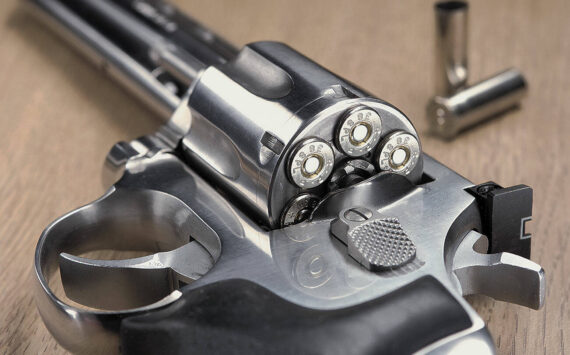On June 7, 2015, in Auburn, Marilyn Balcerak’s son James shot and killed his stepsister while she slept. About 20 minutes later, he shot himself. It was a horrific, bloody tragedy—one that will haunt Balcerak and her family for the rest of their lives. But Balcerak believes it could have been prevented.
James was diagnosed with autism at age 7, and had struggled with severe depression for years. Balcerak describes him as an “adult child” who’d become increasingly suicidal and violent starting in 2012. “We moved out of the house, my partner and I, in the summer of 2014, because James was getting verbally abusive to me,” she says. One night he pounded on her bedroom door, shouting, “Yes or no? Can I kill myself? Yes or no?” Balcerak and her partner called 911. James was 6’5’’; she says she doesn’t know what would have happened if she’d opened the door. It was terrifying.
Although Balcerak did not want her son to own a gun, since he was an adult, she could do little. She spoke with two police officers at the time who told her the only way she could prevent her son from purchasing firearms was if he were arrested for some kind of crime.
Balcerak doesn’t know exactly when James bought a gun at Fred Meyer. But she believes if she could have acted on the warning signs she’d seen, the events of that night might never have happened. “My son and daughter would probably be alive today,” she says.
This is why Balcerak became the citizen sponsor of Initiative 1491, a ballot measure that would enable family members and police to petition for a court order that would temporarily prevent a person from possessing or purchasing firearms. Called “Extreme Risk Protection Orders,” the law would create a civil court hearing process to allow a judge, given enough evidence, to issue a restriction on gun possession for up to one year. Supporters turned in more than 325,000 signatures to the Washington Secretary of State last Thursday, placing it among a handful of measures almost certain to make the November ballot.
The Alliance for Gun Responsibility (the same coalition that created Washington’s universal background-check initiative, I-594) pivoted to the ballot after HB 2461, a similar gun-control bill, went nowhere in the legislature this spring. “There’s no time to waste,” says Stephanie Ervin, campaign manager for I-1491. After legislative inaction, she says, “[We wanted to] take it back to the people and pass an important policy that saves lives as soon as possible.”
Naturally, the horror of Orlando is on everyone’s mind. As with many mass killings, viewed in hindsight, it feels clear that shooter Omar Mateen was “a very dangerous and angry young man who should not have had access to firearms,” says Ervin, pointing to Mateen’s now-public history of domestic violence. “We know the greatest predictor of future violence is past violence.”
But I-1491, supporters say, is just as much about suicide prevention. Although not as high-profile, suicides by firearm strike in far greater numbers than homicides. In Washington state, nearly 80 percent of all gun deaths are suicides; in King County, roughly two-thirds are. According to a 2013 Washington State Health Services report, Washington has a significantly higher firearm suicide rate than the national average, and in parts of the state with the highest rates, one of the corresponding factors is “high firearm availability.”
Though mental-health professionals have long cautioned against the narrative that too often erroneously links mental illness with violence, studies show that some eight in 10 people who attempt suicide do exhibit warning signs. “In most cases, people make their intentions known,” says Ervin. “Removing lethal means is critical to saving someone’s life.”
The measure is modeled after both a similar California law—passed immediately after the Isla Vista shooting in 2014—and Washington’s Domestic Violence and Sexual Assault Protection Orders, which provide a civil process to temporarily restrict a perpetrator’s contact with a victim, either prior to, or often in lieu of, any criminal conviction.
So far, I-1491 has the support of mental- and public-health professionals, domestic-violence-prevention advocates, faith leaders, and members of law enforcement, who say it could be a valuable tool. King County Prosecuting Attorney Dan Satterberg told KOMO news this spring, “I don’t know who would be against disarming somebody who a judge has found to be dangerous.”
According to a poll conducted for the Northwest Progressive Institute, Washington voters also overwhelmingly support the measure; 73 percent of respondents said that they’d “definitely” or “probably” vote yes. “Washington voters are incredibly enthusiastic about I-1491, even if the gun lobby isn’t,” said NPI founder and executive director Andrew Villeneuve in a statement.
A spokesperson for the National Rifle Association in Washington did not immediately return requests for comment. Neither did the Second Amendment Foundation (SAF), based in Bellevue—although SAF founder and executive director Alan Gottlieb has told reporters that proponents of this bill are “spending millions of dollars to violate our right of due process.” At the HB 2461 hearing, opponents expressed similar concerns: A process that infringes on civil liberties without criminal conviction sets a bad precedent.
“This creates novel ways to seize property and deny the right to own firearms to those we merely suspect may do some harm,” testified Phil Shave, executive director of Washington Arms Collectors. “This is a startling, un-American idea. People who have not been investigated, arrested, or charged with a crime will be stigmatized by the justice system … all without acceptable due process.”
Still, as I-1491 is laid out, the due-process bar is set pretty high, making constitutional experts confident it could withstand a challenge in court.
“My hunch is that, on balance, if this were enacted it would be upheld,” says Hugh Spitzer, constitutional law professor at the University of Washington. “It’s a very carefully written initiative.” The only people who can petition for these Extreme Risk Protection Orders are family members, household members, and law enforcement, “a very restricted group of people,” he says. “And then what they have to provide the court is pretty significant evidence” of extreme risk of violence. Plus, the primary legal concerns regarding due process have to do with the amount of time before the individual whose rights are suspended is given a hearing or a trial. I-1491 puts that at two weeks, maximum.
“So your guns are taken away for 14 days” before a hearing, says Balcerak. “Isn’t that worth somebody’s life?”








